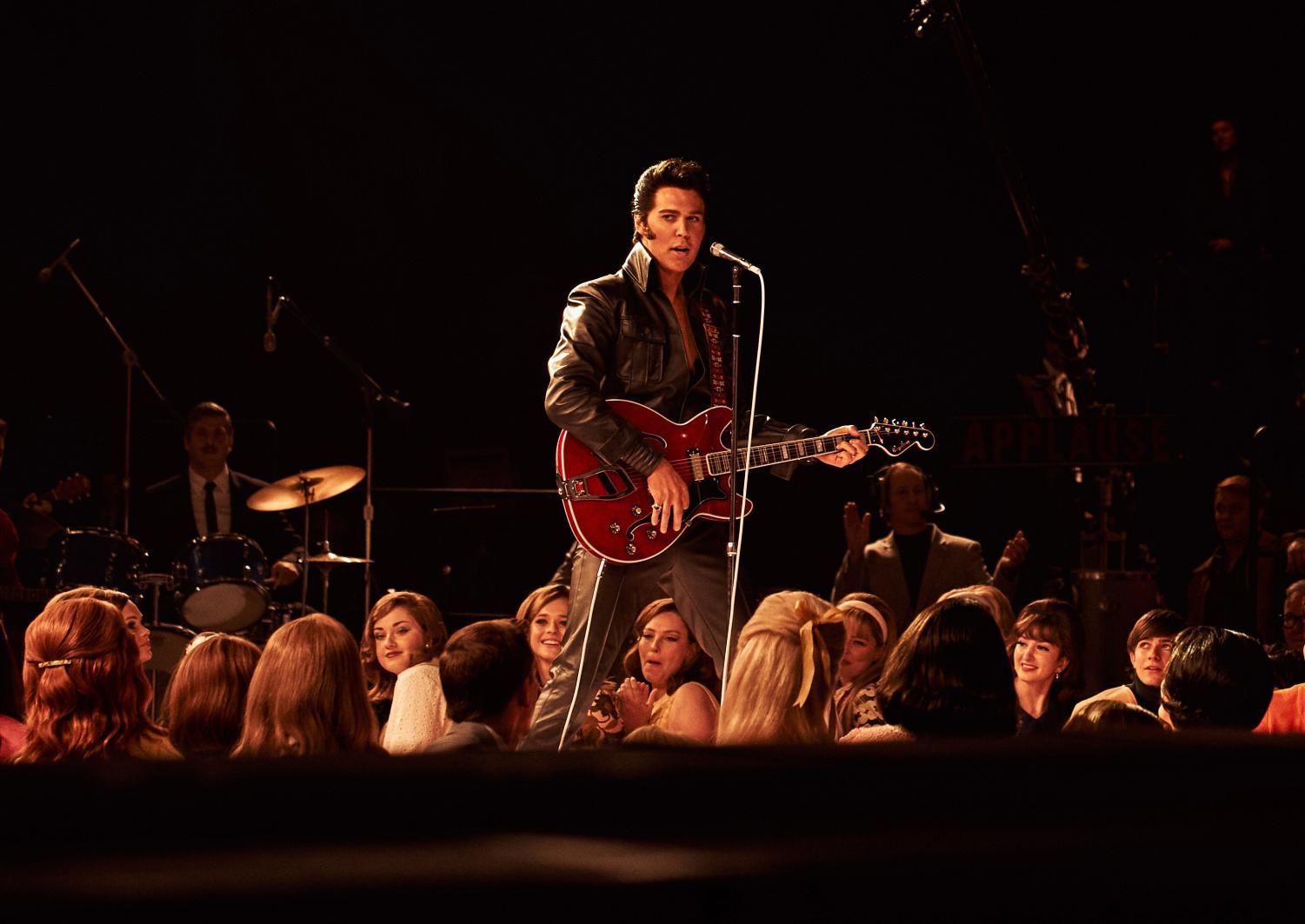Review | ‘Elvis’ — A Film in Two


This image released by Warner Bros. Pictures shows Austin Butler in a scene from "Elvis."
For all its dazzle “Elvis” can’t decide if it wants to be about the singer or his career.
Elvis Presley is one of the most famous names in music history. From the fabled grounds of Graceland to the flashing lights of Las Vegas, Elvis became an icon as much as a man lost within himself. But to tackle the career of one who encapsulated so much to so many is a challenge few directors would take.
Baz Luhrmann, director of “Moulin Rouge!” and “The Great Gatsby,” took that challenge and left viewers with a film that is both an oddly paced biopic and a tremendously performed tragedy. At its heart, the film wants to be the story of Elvis from his start at Sun Records, to Vegas where he became a prisoner to his own fame, but it never quite gets there. For a film that’s meant to be about the King of Rock and Roll, Elvis often feels secondary to another.
The film begins and ends with Col. Tom Parker (Tom Hanks) who is introduced on his deathbed in Las Vegas, 1997. There he recounts his first meeting and eventual relationship with Elvis Presley (Austin Butler). The film then jumps from their meeting to Elvis’ early life and back again in a stream of visual noise.
Luhrmann, known for his breakneck editing and dazzling visuals, gives the viewers a tremendous amount of information and imagery within the film’s first half. But while this quick progression is likely an intentional set up to Luhrmann’s primary interest in Elvis’ later career, viewers who may be fans of Elvis’ early life will find little substance.
These early sequences suffer from rapid and often erratic time skips that are as likely to give the viewer visual whiplash as they are confusion. With Col. Parker’s narration laid over the top of Elvis’ early life, viewers will likely wonder if this is the story of Elvis’ career or the King himself.
While the quick, gyrating scenes may mimic Elvis on stage, they often feel as one viewing him from afar — distant and unknowing. His personal relationships are only shallowly explored, and major characters like his mother, father and wife, Priscilla, are virtually nonexistent to the plot.
This impression does lessen later in the film when viewers are introduced to Las Vegas and how Elvis came to spend 7 years of his life performing at the then-brand new International Hotel. Here the film slows down, relaxes a bit and allows tragedy to unfold without the fast cuts and bright lights. Luhrmann gives Butler the room to breathe life into Elvis — from his first beautiful show in Vegas to his heartbreaking last.
Butler, despite the film’s early stumbles, encapsulates Elvis in a way few ever could. He physically and spiritually embodies the rebel and the family man Elvis desperately wanted to be. But, perhaps best of all, he portrays the lonely, broken man we see in the end sitting alone in his room. A prisoner to his image and the drugs that would eventually be his downfall. From the move of his hips to the timbre of his voice, Butler will likely be a name on everyone’s lips this award season–and it is wholly deserved.
Hanks, too, excels as the sleazy Col. Parker — even if his makeup will probably remind viewers of a certain Batman villain. But his ability to steal the show from Butler is often the reason the film feels like two separate movies — with the first half being predominantly occupied by Col. Parker’s narration of Elvis’ career, and the second half by Elvis’ private life. Because of this divide, many major moments in Elvis’ life come across as shallow echoes with the worst offender being, shockingly, Elvis’ music.
Rock n’ roll, undoubtedly, owes everything to Black musicians who developed the genre from early blues. Luhrmann, to his credit, doesn’t shy away from this truth. But Elvis in Luhrmann’s vision is a champion of the underrepresented while somehow never acknowledging his widespread appropriation of Black music throughout his career.
It is one thing to mention Black influence but another to actually say something about it. Luhrmann fails to do that here, and viewers are left to wonder if Elvis really sat in his room crying at the death of Martin Luther King Jr. or if this was an attempt by the director to make Elvis seem like a champion of Black culture and not a profiteer of it.
But for all its faults, “Elvis” is a film worth seeing, if only for its tremendous performances. Butler and Hank’s chemistry is undeniable, and witnessing the King is an inspiration. Viewers hoping for a deeper look may be disappointed, but those looking for a grandiose, if at times shallow, story will find a lot to enjoy here.
Recent Posts
Porch roof collapse injures dozens during party on Semple Street
The roof of a porch on Semple Street collapsed during a St. Patrick’s Day celebration…
A Good Hill to Die On // Break It Down
In this release of “A Good Hill to Die On,” I dive deep into the…
Who Asked? // Does growth only “count” if it’s quantifiable?
This installment of Who Asked? by staff writer Brynn Murawski wonders why it feels like…
“They’re throwing trans people under the bus”: Counseling center faces backlash after event name change
On Feb. 24, Pitt’s Counseling Center faced backlash after briefly renaming an event from "LGBT…
Q&A: Meet the 2024-2025 SGB president and vice president
SGB announced the 2024-2025 election results at their meeting on Tuesday. The Pitt News spoke…
Editorial | Pitt Administration must listen to its students’ electoral demands
The passing of these referendums does not guarantee a future Pitt with these policies. Merely,…

